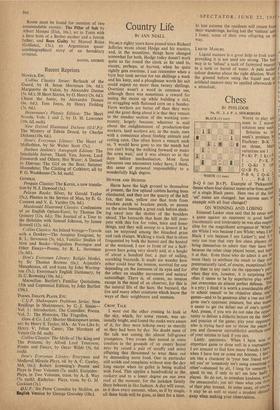Country Life
BY IAN NIALL
NEARLY eighty years have passed since Richard Jefferies wrote about Hodge and his masters, and, in the meantime, things have changed somewhat for both. Hodge today doesn't work quite so far round the clock as he used to, except, perhaps, at harvest, when he quite rightly gets overtime. I can remember when a byre boy took service for ten shillings a week and his keep, and a ploughman worth his salt could expect no more than twenty shillings. Overtime wasn't a word in common use, although there was sometimes a reward for seeing the moon up while building a rick, or struggling with flattened corn on a Sunday. Farm workers are better off than they were and the great thing about it is that they remain in the steadier section of the working com- munity, largely because, whatever is said about the enlightenment of production-line workers, land workers are, in the main, men with a conscience about feeding animals and cutting corn. One often hears a remark such as, 'I would have gone to see the match but you can't bring the milking forward or make the cows wait,' and it was always so in the days before mechanisation. Most farm labourers one encounters today have, I think, this sense of personal responsibility to a wonderfully high degree.


































 Previous page
Previous page